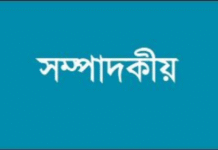Andre Malraux

January 1, 1972 , The Indian Council of World Affairs published a collection of stories about the serious abuses that Pakistani forces committed during the Liberation War of Bangladesh (March 26 to December 16, 1971). Andre Malraux wrote a foreword to this book, “How Pakistan Violated Human Rights in Bangladesh.” Here we publish the foreword.

I would wish these pages were not only an anthology of eye-witness accounts. People of my generation have experienced enough horror to be, alas! no longer shocked. And human nature is such that it is rare that horror does not breed horror.
But for years, horror, in its origin, has been routinely and terrifyingly political.
So, an attempt is being made to convince us that the problem of Bangla Desh is, in its origin, the same.
This is a lie.
The strategists of illusion have explained at length that what was involved was a clash between China (and, if it makes any difference, the United States), and the Soviet Union.
I am well aware that a political problem existed since partition. The British Empire considered that partition was the only way to guarantee the departure of the English, and it had conceived a vast encirclement of Arabia (Turkey, Iran, Afghanistan, Pakistan) which the United States later took over for their count. It was also the encirclement of India, hence the policy of non-encirclement of Nehru. Gandhi had proclaimed the danger of partition not for nothing. Let us be left in peace as regards China: this time, what did she do other than making speeches?
But still, if Marshal Yahya Khan had not decided to exterminate the Bengalis, and if he had not sent his planes to bomb Indian Airfields, what would be the role of China, the United States, the Soviet Union in this affair? As is the custom, each ambassador would have defended his country. The Pakistani ambassador in France — I repeat: of Pakistan — nobly defended Pakistan, He did not kill anybody. The electoral victory of the Awami League was troublesome for Islamabad. The electoral victory of the people’s front was so for the French right, it did not exterminate its opponents for all that. If politics is an art, it is one of reconciliation and not of assassination.
Those volunteers who were ready to fight with me for Bangla Desh belonged, in France and elsewhere, to varying political parties. At that time, they were hardly aware of India’s stand — (for she scarcely had any….). They were motivated by two facts, to which the memory of Biafra gave a tragic resonance: The exodus of the refugees, the extermination of the Bengali elite.
Firstly, the refugees. While our press was placing them on the same level as Yahya’s troops, the fact remained that India had to take in ten million Hindu refugees, and that Pakistan did not have to take in a single Muslim refugee, not even from Kashmir. One knows the exchange General De Gaulle had with a French major in Syria who said: “After all, we are too ill-informed to take sides.” “Ill-informed, possibly,” answered the General, “but someone did tell me that the Germans were in Paris.” This time, however ill-informed it was — and it was not really well informed — the world did accept that the refugees were in India.
The second particular characteristic of the Bengali tragedy was the systematic, organizedextermination of those who, in Bangla Desh, had voted against Marshal Yahya. We know now of wells filled with dead bodies of intellectuals. They were selected, well selected. And, this time the Hindus were not involved. I must emphasize this because it is easy and sinister to make out the tragedy of Bangla Desh (the West did so) as a war of religion. If the Muslims of Bangla Desh had been in agreement with Islamabad, how would the Awami League have managed to obtain 167 out of 169 seats? And who does not know still that a large number of the leaders of the resistance, those whom the Marshal called deserters, had been officers of the Pakistan Army? Nobody disputes that the Hindus were the first to feel themselves threatened. But the civil war, until the intervention of the Indian Army, was not religious, it was national: That of the Muslims of Dacca against those of Islamabad.
Assuming the worst (but without bloodshed) the Pakistan of Islamabad could survive without Bangla Desh, the proof is that it is doing so now. When a state wishes at all costs to make secession impossible, the wisest policy is not to treat half of its territory as a conquered country. When the revolt started, the soldiers of Islamabad were no longer, for the East, compatriots or co-religionists, they were occupants.
If there is any doubt about this, let one read the following eye-witness accounts.
Source: The Daily Star









